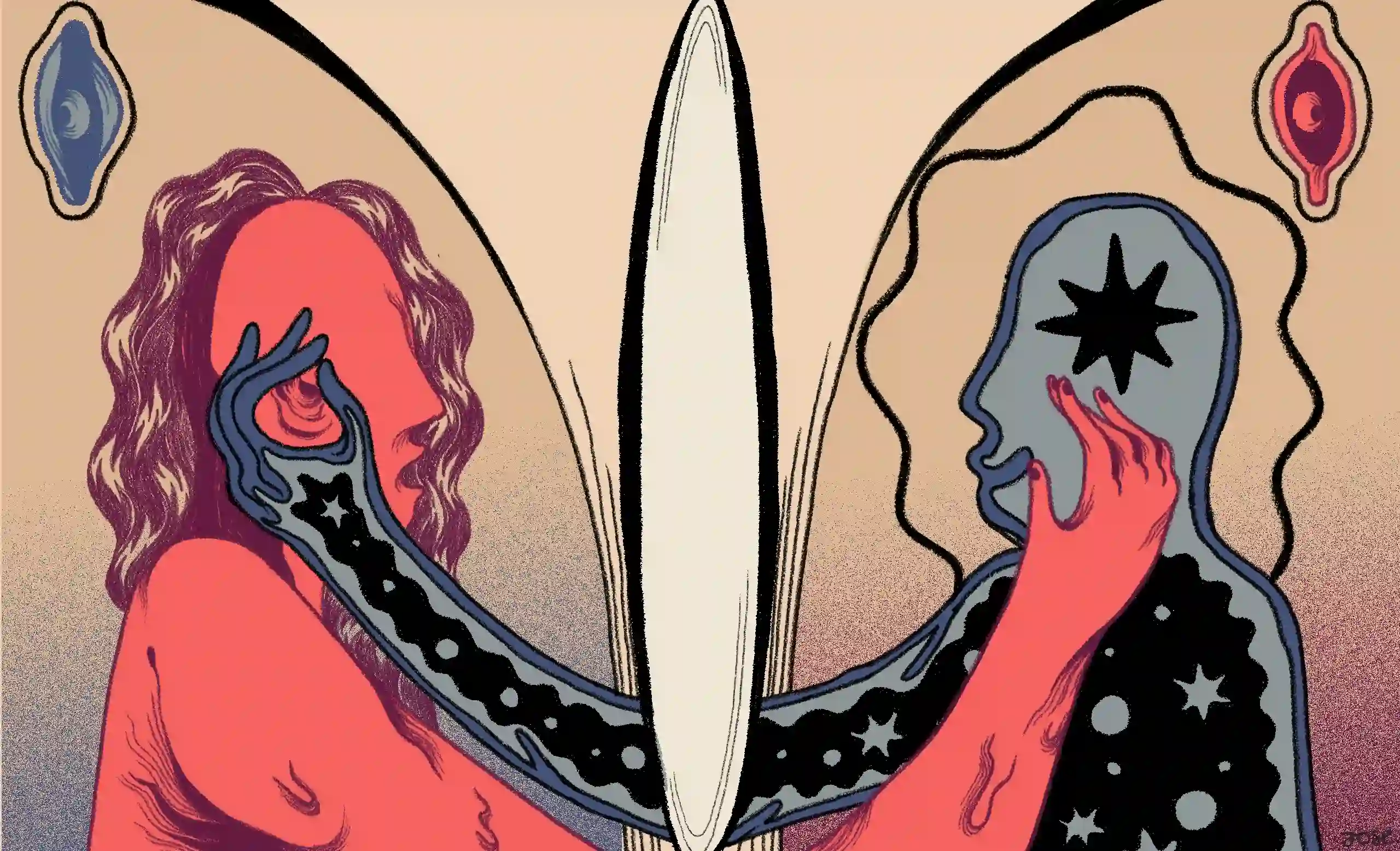For me, the psyche or the unconscious is a dimension of all reality that cannot be felt, thought, touched, heard or seen directly and yet is a powerful and continuous force influencing everything we feel, think and sense — what we love or hate to eat, who our friends are, how we relate to our families, who we choose as our partners or elect as our political leaders.
The unconscious is like a storehouse that contains traces of every experience we have ever had in our life (in fact, every experience we have had since we were in the womb). No experience vanishes without a trail. The unconscious stores the traces of all experiences without any judgment whatsoever.
Nothing is censored. Nothing is rejected. Nothing is forgotten.
The traces of every such experience can return from the unconscious to the conscious. They are seen and heard through slip of tongue, as acts that were not consciously intended, including dreams and fantasies. However, when traces in the unconscious make their presence felt in the conscious mind, they cannot be read in literal and direct ways. They have undergone repression and returned to the conscious realm in ways that can be likened to trickery — clever enough to bypass the censorship of the conscious mind.
Although we typically think of the unconscious in terms of the individual, there is also a collective unconscious. As my favourite feminist psychoanalyst Jacqueline Rose writes, “We are peopled by others”.
For far too long I have lived (and I suspect so have you) in a fantasy that proclaims this: what we sense, feel and think is all that there is to our individual and collective lives. That the world I am aware of is all that exists; that which I can deliberately and intentionally communicate through words or gestures is all that matters.
But if that were all, why would I be teased or haunted (or land on some shade of bewilderment in the spectrum between the two), by so many things that don’t make sense, that cannot be understood with the cognitive mind, that cannot be said in words and not even in gestures, however much I want it to be so? In all this and more, the psyche is the missing piece of the puzzle.
I now want to share with you some glimpses from a piece of anonymous, unpublished research (how apt for writing on the psyche) on love and sex. The research involved an anonymous online survey in which respondents were asked to share their experiences of romantic-sexual love as well as their dirtiest, hottest fantasies, which they did, safe in the knowledge that even their email ids would not be revealed (thanks to survey monkey!). It was not a large survey. There were 30 respondents. The respondents were all urban, English-speaking and more than half identified as female and feminist. As part of the research, semi-structured in-depth interviews on romantic sexual love were also conducted. A literature review of selected writings by psychoanalytic thinkers informed reflections on the responses to the survey and the interviews with the help of concepts from psychoanalysis.
One of the interviewees, Z, was someone the researcher had studied with, but had fallen out of touch for the past decade. As young feminists, they had similar ideas about love and desire, and a shared rallying cry about friends being as important, if not more, than lovers. All these years later, when they meet and Z was asked about love, she chides, “Don’t you want to ask me about friendship instead?”
Later, she narrates:
“The lover became my default setting. The connection that made me feel truly alive. Even good times spent with the best of friends were a few shades less bright. Watching a film and not telling him about it would be like not having watched the film at all. Wearing that new dress and not sending him a photo, hearing that song, and not sending him the link…the experience would not be complete.”
“And respond he must. His gaze, come what may, must not shift away from me. I felt nothing short of panic when I looked up at him, as it were, to find that it had shifted away from me. Of course, often enough, it had. And I went waan (imitating the sound of a baby crying for attention). Online I mean. If this did not work, then waaaaaan, and if that did not work either then waaaaaaaaaaan. We’re talking here of a woman in her late 40s, almost 50! When the cuteness ran its course, the lashing out began: ‘I
don’t have time for you either’, ‘Who cares anyway’. Message after message. Only to be told, ‘Sorry, the boss is visiting’, ‘The wife is sick’, ‘ The colleague is suicidal’. Often nothing less than this would bring home how cruel reality was. The competition was not just with the real or imagined lover of my lover, but with life itself. Poor me. The sense of never-enoughness never seemed to go away.”
“I knew he was having an affair. He always came online at precisely the same time as her; I kept checking to see if it happened. Moving from him to her and from her to him — no less riveting than the Wimbledon finals! Despite my best efforts at trying to remind myself that we were in a poly relationship, I made life miserable for myself and certainly for him. He kept denying it and of course, it turned out that he was having an affair with her after all.”
“I shock myself; I disgust myself. But there was something almost addictive for me about this wanting to return again and again to jealousy. Whether in fantasies or how it translates into real life, jealousy almost has a delicious quality to it, even as it torments me. It’s like from time to time my system needs a fix of jealousy, and I watch myself trying to seek it out. It’s the bane of my life. That wanting, almost needing, to return over and over again to that place of being excluded, of watching. That checking again and again the Facebook page of real or imagined lover/s of the lover.”
One of the many threads explored in this interview with Z included the specificity of romantic-sexual love. Desire can be at play in friendships too, of course — and it would be dishonest to take the erotic out of friendships — but what is the specific psychic charge to romantic-sexual love?
For this inquiry, we can turn to psychoanalyst Urvashi Agarwal, who writes, “Sexual experiences are so powerful because they are reminiscent of our first most intimate contact with a body, the body of the mother.” Of course, she is writing about the sexual, which we know can be independent of the romantic, and not connected to love (and vice versa), but she points us to an important idea: that of our first intimacy and its connection to the mother.
Rather than ‘mother’ we could well think of ‘the primary care-taker’.
However, given the realities of heteropatriarchy, let’s stay with ‘mother’.
While our first memory of intimacy is with the mother, it is also an intimacy that soon undergoes change. The pleasure that the infant child could once derive from its mother’s body, and its own body, begins to be regulated. The fantasy is that the mother is ours only. Moving from infancy to childhood meant other harsh encounters with reality. It turned out that our mother was not, after all, ours alone. She had other people in her life and other demands were being made on her, not least by the father. This brings the first fantasy of our lives to a cruel end: the fantasy of primal unity with the mother, a rupture in the imagined one-ness with her. From that point on, access to her will always be marked by prohibitions, whether by others on us, by demands placed upon her, or her own desires.
Love, and in particular romantic-sexual love, seems to offer the fantasy of continuity — of making good of the loss. As if love takes us back to the moment before our birth, when a physical continuity existed between us and our mother. The moment of birth also marks the moment when we become separate, discontinuous beings. While the journey of life repeatedly reminds us of this harsh reality, through love we seek, even if briefly, to try to find continuity between ourselves and the lover.
This is what Z experienced as the frustration and impossibility of what she called her “urge to merge”. Lacanian psychoanalysis helps us understand this powerful feeling with the following hypothesis: “the existence of an initial mother-child unity that is lost at the time of weaning. It is at the moment of weaning that the child loses the ‘unity of himself’”. Bruce Fink builds on Lacan’s hypothesis in the context of love, as he writes,
[…] the attempt to merge two into one is an attempt to turn back the hands of time, to return to a moment before alienation and separation have occurred […] It is an attempt to reverse the loss of the object, to make it such that there is no lost object, to make good the rift between mother and child.
Although the rift between mother and child can never be traversed (not least because there was no unity, it was a fantasy), the incessant desire to regain the lost one-ness, the fantasy of continuity, haunts love.
No wonder Z felt bewildered about love’s “never enough-ness”. This was the first of many bewildering questions that came up over and over again during the course of the research. So much so that, despite not being a fan of hashtags because of their ability to reduce realities to stereotypes, the bewilderment seems best articulated as hashtags like #HowCanItBeThatIt’sNeverEnough?
The excess and insatiability of such neediness also invite us to understand the key psychoanalytic idea of ‘lack’.
Birth itself — emergence from the womb into the world, much more helpless than any animal, needing to communicate with others — meant that as infants we were marked by lack. The trauma of birth, followed by the loss of the imagined one-ness with the mother, compelled our infant psyche to take its desire elsewhere.
In psychoanalysis, nothing is as it seems. Lack is not as tragic as it may sound. Lack, in fact, is what makes all desire possible. Not sexual desire but any kind of desire — whether related to love, food, clothes, job, where we want to live, who we vote for et cetera. Strictly speaking, all human desire stems from this lack, this lack-in-being or want-to-be (manqué-a-etre). Making accessible the notoriously dense articulations of philosopher and psychoanalyst Jacques Lacan, Fink writes,
Where there is no lack, there can be no desire. The role of desire aspires to make good this lack, to compensate for it. And each desire for something new is but the continuation and displacement of the self — same desire stemming from the same old lack.
The logic of desire is that of insatiability.
Desire can never be fulfilled, referred to by Lacan as the metonymy of desire, or what he calls “desire for an unsatisfied desire”.
All desire can then be seen as the search to make good all that the unconscious experienced as loss. Desire is continuously chasing (for one’s entire lifetime, to be more precise) the elusive something that Lacan called the objet petit a, which represents for the subject that primal, original loss. Also referred to as ‘the lost object’, the objet petit a is not one particular object, but a placeholder. The designated object keeps changing, nameless and, by definition, quite elusive.
Over a lifetime, this object proliferates across a range of things, contexts, and scenarios.
It is not only romantic and sexual desire that lack gives rise to, but all desire.
Hence the search takes us not only to a certain kind of lover, but towards certain kinds of sex, jobs, a favourite colour, a preferred style of clothes, a certain kind of education, political ideology, organisation or political leader.
It is the lost object that all fantasies are in search of. We might glimpse the lost object in the most unlikely places. In the context of sexual and romantic attraction, it might be the tone of someone’s voice or the way that they flick their hair that pushes us towards them. No wonder that love, or lust, at first sight makes little sense. It is as though the lost object has been glimpsed in the other. The psyche yearns, if I may be inaccurate and attributes feelings to the psyche (even though feelings — precisely because we experience them consciously — are not in the realm of the psyche), for the lover to fill the lack.
Psychoanalysis reveals that the search for the lost object is a never-ending one, there is no ‘finally’ getting anything. We are always at some point in the never-ending chain of desires in the impossible search to make good the lack. Desire born of lack shifts from one object to another — the objects of our fantasies.
Z allows us to witness how effectively love can help us see the play of the unconscious — the yearning for continuity, the repeated frustration of not being able to get what we are seeking for, as well as the utterly powerful but alas, fleeting sense that we have found what we are searching for.
Read the entire series here.





